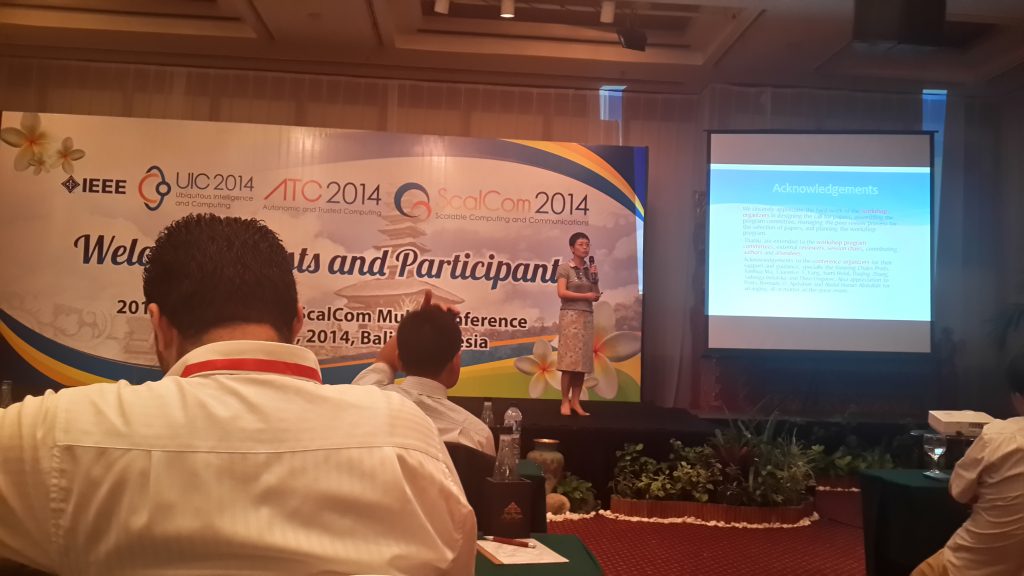Two papers of SPLab are published in UIC2014 international conference
During 9th to 12th Dec this year, the 11th IEEE International Conference on Ubiquitous Intelligence and Computing(UIC2014) was held in Bali, Indonesia. Two papers of System Safety and Privacy Protection Laboratory(SPLab) were presented in UIC2014, which are “Historical Trajectories Based Location Privacy Protection Query” and “Privacy Perceptive Wireless Service Game Model”. Prof. SUN Yuqing, the workshop chair of UIC2014, got “Outstanding Leadership Award”.
UIC2014 is listed by China Computer Federation(CCF) and is recognized as an influential international conference in ubiquitous computing area. CAO Liu, an undergraduate student of Taishan College of Shandong University, took part in this international conference and presented the papers. He joined in SPLab in this spring and specializes in mobile computing now. This is the first time that an undergraduate student published a paper in the international conference as the first author in SPLab. LI Weiwei, who is a master student of Shandong University, specializes in “privacy protection based on game theory” and “security policy and audit” now.
Liu Cao, Yuqing Sun, Haoran Xu. “Historical Trajectories Based Location Privacy Protection Query”. The 11th IEEE International Conference on Ubiquitous Intelligence and Computing.
Abstract—With the wide adoption of intelligent mobile phone with global positioning functionalities, location based services(LBS) are more and more popular. Location privacy becomes an important issue. The current methods on privacy protection can be classified into the following folds: privacy preserving LBS query in a real time manner, privacy protection on historical trajectory data publication afterwards and location based recommendation. In this paper, we investigate the location related privacy problem in a different way by utilizing the increasing volume of historical trajectory data for personal privacy analysis, which can help LBS users have a better understanding on their privacy status. We propose an efficient way to organize the spatial and temporal data, which integrates quad-tree and hash function based on time slots as index. By analyzing user privacy requirements on LBS, we propose two basic queries and algorithms, which verify an LBS user’s privacy status at certain location and time. Considering complex privacy query, we propose some combined algorithms to solve the continuous privacy query problem on both spatial and temporal dimensions. Experiments are performed on real dataset to verify our method.
Download: Historical Trajectories Based Location Privacy Protection Query
Weiwei Li, Yuqing Sun. Privacy Perceptive Wireless Service Game Model. The 11th IEEE International Conference on Ubiquitous Intelligence and Computing.
Abstract—Wireless applications are taking an important role in our lives. More and more merchants begin to provide wireless connection so as to attract customers. For business purpose, they often ask customers to provide their personal information for using wireless, which may threat customer privacy. So, it is desired to make a tradeoff between the competitive profits of both service providers and user privacy. In this paper, we introduce a privacy perceptive service model based on game theory, which takes into account the interests of all stakeholders. Considering the characteristics of customer behavior in practice, we design the complete information and sequential game. Users are allowed to provide different levels of personal information as their preferences, while a merchant assigns different wireless bandwidth based on customer provided information. The Nash Equilibriums are discussed so as to find the acceptable strategy. Quantitative study is performed on the impact of each parameter in the game, which could help merchants to design appropriate policies.
Download: Privacy Perceptive Wireless Service Game Model



